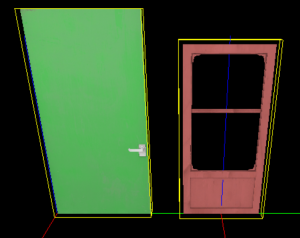prop_door_rotating_checkpoint
| CPropDoorRotatingCheckpoint |
prop_door_rotating_checkpoint is a point entity available in ![]()
![]() Left 4 Dead series. It is a special variant of prop_door_rotating for checkpoint doors in the world.
Left 4 Dead series. It is a special variant of prop_door_rotating for checkpoint doors in the world.
Hinge Axis in Hammer is broken. A workaround is to simply modify the model and set the origin to the hinge location. [todo tested in ?]Supported Models
Most newer games such as ![]() have a model folder called
have a model folder called props_doors, which feature various door models (including static props that will not work for prop_door_rotating). For a door model to be compatible, it must be a physics prop and its model origin must be on the hinge side of the door, as doors rotate around its origin.
Keyvalues
- Name (targetname) <string>
- The name that other entities refer to this entity by, via Inputs/Outputs or other keyvalues (e.g.
parentnameortarget).
Also displayed in Hammer's 2D views and Entity Report. - See also: Generic Keyvalues, Inputs and Outputs available to all entities
Keyvalues / Inputs / Outputs are same as prop_door_rotating.Custom Door Models
- Create
ACT_IDLE,ACT_DOOR_LOCKEDandACT_DOOR_OPENactivities. - Add a
door_options$keyvalues block:
$keyvalues
{
prop_data
{
blocklos 1
}
door_options
{
default // Fallbacks if something is missing elsewhere
{
open Doors.FullOpen1
close Doors.FullClose1
move Doors.Move1
locked DoorHandles.Locked1
unlocked DoorHandles.Unlocked1
}
hardware0 // First hardware type, by default a handle
{
locked DoorSound.Null
unlocked DoorSound.Null
}
hardware1 // Push bar
{
locked DoorHandles.Locked1
unlocked DoorHandles.Unlocked1
}
hardware2 // Keypad
{
locked DoorHandles.Locked2
unlocked DoorHandles.Unlocked2
}
skin0 // Skin-specific sounds, including a custom surfaceprop.
{
open Doors.FullOpen4
close Doors.FullClose4
move Doors.Move4
surfaceprop wood // If no skin is specified, surfaceprop is always wood, no matter what's written elsewhere
}
}
}
 L4D Series Doors
L4D Series Doors
The Left 4 Dead series introduced a new set of doors that can be broken down by Infected.
Those new doors make use of $collisiontext and new "Pound" and "Damage" listings in door_options, highlighted below.
Some doors in L4D2, which were ported from L4D, also have the following activities, although they do not seem to work: ACT_DOOR_ANIMTOLOCK, ACT_DOOR_ANIMTOUNLOCK, ACT_DOOR_OPENFAIL.
ACT_DOOR_LOCKED do not seem to work. Only workaround seems to be manually adding I/O connections to the door in hammer, or play a specific sequence when used while locked.$collisiontext
{
break
{
"model" "Props_downtown\door_interior_128_01_dm01_02" //Spawns a debris model.
"health" "100"
"fadetime" "10"
}
}
$keyvalues
{
prop_data
{
"base" "Door.Standard"
"allowstatic" "1"
"blocklos" "1"
"dmg.bullets" "0" //Bullets will no longer damage this door. In L4D2 this is only used on the last damage model.
}
door_options
{
"defaults"
{
"open" "Doors.FullOpen1"
"close" "Doors.FullClose1"
"move" "Doors.Move1"
"locked" "DoorHandles.Locked1"
"unlocked" "DoorHandles.Unlocked1"
"pound" "Doors.Wood.Pound1" //Sound that plays when infected attack the door to break it down.
"surfaceprop" "wood" //Overwrites Surfaceprop.
"damage1" "props_downtown\door_interior_128_01_DM01_01" //What the first damage model is.
"damage2" "props_downtown\door_interior_128_01_DM02_01" //What the second damage model is.
"damage3" "props_downtown\door_interior_128_01_DM03_01" //What the third damage model is.
}
}
}
The "Damage1", "Damage2" and "Damage3" lines determine what models will be used for the broken stages of this door model.
See also
- func_door (sliding, brush-based)
- func_door_rotating (brush-based)
- Door creation
- WiseDoor - example use and illustration of doors.
